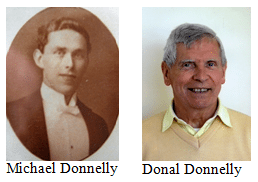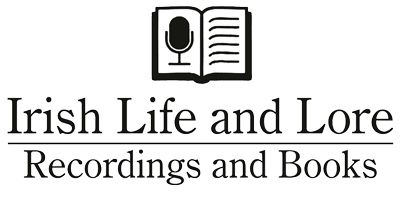Alex Findlater’s grandfather, Captain Henry ‘Harry’ de Courcy-Wheeler, took the surrender from the insurgents at Easter Week 1916. The historical background to the Wheeler family since the sixteenth century is described. Alex’s great-grandfather was a celebrated surgeon in Dublin and Harry, his second eldest son, qualified as a barrister. On the outbreak of WWI, Harry enlisted with the King’s Royal Rifles and served with the Army Service Corps, based at the Curragh camp. He was responsible for the accommodation of the troops at barracks and for the condition of the camps. He relocated to the army camp from his house at Robertstown with his family and servants. Alex describes his grandfather’s daily life at Curragh Camp. His grandmother, Selina Knox, was a hockey international who organised matches at the camp. The period before the Rising is discussed. Alex explains that his grandfather was given a document by the Irish Volunteers to certify that his property at Robertstown would be protected while he was at the Curragh. Alex describes the call for his grandfather to report to General Lowe at 10.30 p.m. on Friday 28th April 1916, at the end of Easter Week. Captain de Courcy-Wheeler arrived at Parkgate Street early on Saturday morning, and Alex describes the activity and the general atmosphere which awaited him. When Nurse O’Farrell arrived with the surrender message, Harry and General Lowe went to Parnell Square to instruct her. The surrender by Patrick Pearse is discussed and Alex speaks about the photograph of this surrender. He corrects the assertion that his grandfather appears in this photograph, and Alex suggests that probably Harry took the photograph himself. The presentation made by him of arms and photographs to President Seán T. O’Kelly in 1948 is recalled. Alex discusses the modern cameras that his grandfather owned and suggests that he would have been conscious of being a witness to a significant event. The recording by Captain de Courcy-Wheeler and others of the names of surrendering insurgents is mentioned. Eighty-four people were listed, including Michael Collins and Willie Pearse. Alex considers the surrender notes and discusses his own research. He explains that each of the British Army commands had to get a copy of the surrender note. Nurse Elizabeth O’Farrell travelled with de Courcy-Wheeler to the various command posts to deliver the notes. Alex details his grandfather’s transactions with various commanders at the posts. He emphasises the fact that only three commanders signed the main surrender note and the others had to obey the orders. The surrender of Éamon de Valera to Captain Hickson is described, and Alex mentions the lifelong friendship that developed between these two men which began at this time. The family relationship between Alex’s grandmother, Selina Knox, and Constance Markievicz is described. Alex remembers his grandfather from the time when he lived in retirement at Foxrock, and a visit he made with his grandfather to Nelson’s Pillar is recalled. Harry formed a friendship with de Valera and Seán T. O’Kelly. The Findlater shop in Sackville Street, owned by Alex’s paternal grandfather, is recalled, and he mentions that this shop was not looted during Easter Week. He recounts an anecdote relating to de Valera and Harry de Courcy-Wheeler. In as much as Alex is aware, his grandfather spent two days in central Dublin in April 1916. Subsequently, as the arresting officer, his role was to identify the prisoners at the courts martial. Alex considers the conduct of the courts martial and of General Maxwell. Since 2000 Alex has been researching his family history and has discovered information about his grandfather’s role in the Rising. The items given to him by surrendering parties are described. In 1948 he presented the revolvers to the nation. Alex recalls as a young boy play-acting with them at his grandfather’s home the day before the formal presentation. The presentation was publicised in the newspapers of the day. Alex again considers the surrender notes, and he explains that he has examined these and discusses the subtle differences between them. He reads Pearse’s surrender note written on April 29th 1916. He explains that the small Volunteer detachment in North Brunswick Street under Patrick Holahan refused to surrender on April 29th. General Lowe asked Pearse to write a note, dated April 30th, and this was given to Holahan by two Capuchin monks. Alex believes that this was the note which was sold for €700,000 in 2005 at auction. He explains that there are several original surrender notes extant. Through his researches he has uncovered some interesting features about the surrender and about his grandfather’s activities in 1916, and also about his life. He mentions the surrender manifestoes, the photographs, life at Curragh Camp and a recording of his grandfather’s voice. He describes Harry de Courcy-Wheeler’s Christmas message to his children and his playing Home sweet Home on this recording.

Alex Findlater (b.1937)
 Declan Coogan (b.1969)
€10.00 – €20.00
Declan Coogan (b.1969)
€10.00 – €20.00 Donal Donnelly (b.1939) and Caitríona Donnelly
€10.00 – €20.00
Donal Donnelly (b.1939) and Caitríona Donnelly
€10.00 – €20.00Alex Findlater (b.1937)
€10.00 – €20.00
Additional information
| Type: | MP3 |
|---|---|
| Audio series: | The 1916 Rising Oral History Collections |
| Bitrate: | 128 kbps |
| Download time limit: | 48 hours |
| File size(s): | 54.64 MB |
| Number of files: | 6 |
| Product ID: | CD191602-011 |
| Subject: | Henry de Courcy Wheeler (Interviewee’s grandfather) |
| Recorded by: | Maurice O’Keeffe – Irish Life and Lore |






